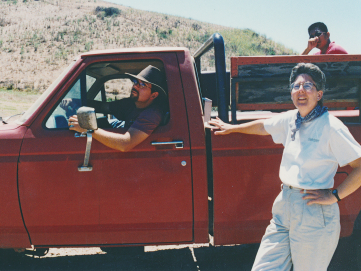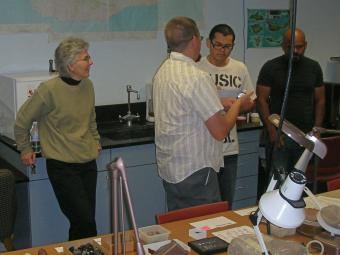In Memoriam: Jeanne E. Arnold (1955–2022)
In Memoriam: Jeanne E. Arnold (1955–2022)
Willeke Wendrich[1]
After a long illness, anthropologist and archaeologist Jeanne Arnold passed away on Sunday, November 27, 2022. Jeanne was professor in the Department of Anthropology and a core faculty member of the Cotsen Institute. She received a BA in anthropology (summa cum laude) from the University of Michigan in 1976 and subsequently both an MA and a PhD degree from the University of California–Santa Barbara. In 1983 and 1984 she was a visiting professor at Oregon State University and from 1984 until 1988 an assistant professor of anthropology at the University of Northern Iowa.

Jeanne Arnold (right) discusses survey strategies during fieldwork on Santa Cruz Island in 1998. Anthony Graesch (Connecticut College) is at the wheel, and Howard Tsai (University of Michigan) in the bed of the truck.
In 1988, Jeanne came to UCLA as an assistant professor in residence at the Department of Anthropology and the associate director of the Institute of Archaeology, now the Cotsen Institute. In 2000, she was promoted to full professor of anthropology and between 2001 and 2006 she served as the vice-chair of the Department of Anthropology.
Jeanne distinguished herself as one of the leading North American archaeologists of her generation and contributed to our insights in the sociopolitical emergence of complex hunter-gatherer societies in California. She published in many leading journals on her extensive fieldwork on the northern Channel Islands, as well as in southwestern British Columbia. Her main interest focused on how specialized craft production, labor organization, and exchange relationships impact political formations. After her retirement, most of Jeanne’s notes and finds resulting from her fieldwork in California were shipped to the Smithsonian Institutions in Washington DC, with the indispensable assistance of Scott Sunell, one of her former graduate students, and Alfonso Lopez, the office manager of the Cotsen Institute.

Jeanne (left) in her laboratory in the Cotsen Institute during the open house in May 2011
As a dedicated teacher, Jeanne acted as a mentor and supervisor of numerous undergraduate and graduate students, many of whom went on to pursue careers in higher education, cultural resource management, and beyond. Among them is Jason De León, now himself a professor of anthropology at UCLA and a core faculty member of the Cotsen Institute.
Extending her interests in materiality and quotidian household life, Jeanne collaborated with Linda Garro and Candy Goodwin as core faculty members of the Center on Everyday Lives of Families at UCLA, a 10-year interdisciplinary research program directed by Elinor Ochs and supported by the Alfred P. Sloan Foundation. Innovatively extending archaeological methods and sensibilities to the study of middle-class family life in Los Angeles, Jeanne worked closely with postdoctoral researcher Anthony Graesch, a graduate from the Cotsen Institute and now a professor at Connecticut College.
In 2012, this work culminated in the publication, by the Cotsen Institute Press, of the award-winning and best-selling book Life at Home in the Twenty-First Century: 32 Families Open their Doors. Reflecting on their long collaboration, Graesch writes about Jeanne:
She was an intellectually formidable and highly influential scholar, teacher, and mentor, pivotal in moving California archaeology beyond regional and into national and international, theory-imbued conversations. Her scholarship questioned an assumed primacy of specific food-production strategies (agriculture) in the emergence of institutionalized power differentials in human societies, and she reframed complex hunter-gatherer societies as not mere exceptions to normative cultural-evolutionary patterns, but rather examples of creative social and political strategies that anthropologists still do not fully understand. Throughout, Jeanne trained a generation of archaeologists in the most rigorous field and laboratory methods that I have encountered in our discipline. She held her students to high standards, was exceedingly generous with her time and intellect, and she possessed a great deal of patience. Her legacy is impressive and indelible. Her many students are now directing cultural resource management firms, fill positions in government, or landed academic posts. They are collectively training a new generation of archaeologists and exert a positive impact on the larger domains of heritage conservation, management, and higher education.
This sentiment is echoed by Jason Throop, the chair of the Department of Anthopology, at the end of his message to academic community: “Speaking for many of us who knew Jeanne personally, I know that she is already deeply missed as a generous friend, collaborator, and colleague.”
To honor the life and work of Jeanne Arnold, donations can be made in her name to either the Michael J. Fox Foundation for Parkinson’s Research or the Best Friends Animal Society.
[1] Director of the Cotsen Institute and the Joan Silsbee Chair of African Cultural Archaeology, Department of Near Eastern Languages and Cultures.
Published on December 6, 2022.


